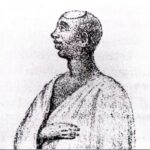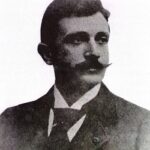JOHN MACAULAY
- 6 Min Read
‘King’ John Macaulay (circa 1800-December 5,1867) was a wealthy Freetown trader in the mid-19th century and powerful unofficial leader of the Aku re-captives (Yoruba from what is now Nigeria). He played an important role in reducing inter-ethnic conflict in Sierra Leone by persuading the various racial groups in and around Freetown to form multiracial councils to arbitrate disputes.
Macaulay was a Hausa Muslim who was recaptured between 1815 and 1822 and brought to Freetown. Being an enterprising young man, he quickly prospered as a trader. He was also a man of great physical strength which earned him the nickname of “Atapa,” (from the Yoruba word for “kicker”) as he was reputed to use both feet and hands in fighting.
It seems likely that in the 1820s he was headman in one of the provident societies started as a means of self-help for settlers and re-captives by “King” Abraham Potts, an African ex-soldier who had settled in Freetown. From the late 1830s onwards Macaulay served in a number of minor positions, including that of policeman, with the colonial administration, and in 1849 was appointed overseer in the Liberated African Department Yard (where re-captives were first brought) by acting Governor Benjamin Pine (later to serve as governor from 1857-60).
More significantly, Macaulay succeeded to the position of king of the Aku on the death of their former king, Thomas Will. Although unofficial, this position as head of the largest and most powerful ethnic group among the re-captives carried great authority; even the rich and influential obeyed their leader under threat of severe social sanctions, such as the denial of burial rites.
Macaulay’s success as a trader also contributed to his rise to leadership. By the late 1840s his business was large enough for him to use his own ship to trade with Badagry, Nigeria, carrying cargoes (sometimes illegal) of tobacco and rum. When he retired from government service in 1853 he invested his profits in property and ran a retail spirit trade from his house.
The position of Aku king was one which at times involved Macaulay closely with the administration, to whom he could be very useful in times of crisis, though at others he was not always viewed with favor. In 1843 a serious conflict flared up at the re-captive village of Waterloo between the Aku, the Calabar, and the Ibo, (all groups of Nigerian origin), and troops had to be sent from Freetown to restore order. To try and effect a settlement between the contestants the governor sent King Macaulay to Waterloo.
Macaulay persuaded the various groups to form a super-ethnic council to include one member from each of the 17 major ethnic groups at Waterloo. The function of this council, which became known as the Seventeen Nations, was to settle all petty grievances as well as helping maintain law and order. Macaulay’s Seventeen Nations turned out to be a very manageable form of government, and the organization continued in Waterloo under successive presidents till the end of the 19th century.
In 1851, disputes similar to those at Waterloo broke out between the Aku and other groups at Hastings.War was averted largely through the intervention of King Macaulay who was able to calm the Aku and keep them from fighting. Here, too, he instituted a modified form of the Seventeen Nations council.
Gradually this system of local government spread to other villages around Freetown and throughout the colony, being particularly effective in areas where the colonial administration provided little in the way of supervision. In Hastings, the Seventeen Nations in time grew powerful enough to prevent an influential Freetown Krio (Creole), William Grant, from taking over 1,000 acres of land near Hastings village in the 1880s, despite the fact that Grant had obtained permission from the governor.
Macaulay’s influence in Freetown, based on his position as Aku king, extended to other matters than establishing the Seventeen Nations councils. In 1847 he was a leading signatory to the petition sent by the colony’s local population to the secretary of state in England requesting the recall of Governor N.W.
Macdonald (term of office 1846-52), an overbearing and anti-African governor. He was also approached for help by colonial officials. In 1864, the colonial surgeon, Dr. Bradshaw, faced a lawsuit with claims for £200 damages for striking his groom. It was only with Macaulay’s assistance that he was able to settle the matter out of court by paying £30.
In the 1840s Benjamin Pine, acting governor while Macdonald was on leave, asked for Macaulay’s help over the question of sending newly arrived Aku re-captives to the West Indies. This was an official emigration policy that the administration had unsuccessfully tried to implement, but with Macaulay’s assistance, it was reviewed. In reward for his help, and because he considered him trustworthy, Pine made Macaulay overseer in the Liberated African Department Yard in 1849.
When Governor Macdonald, for whose recall Macaulay had petitioned, resumed office he tried unsuccessfully to remove him from the post. The Colonial Office found his reasons unacceptable, and Macaulay, whom most governors feared rather than respected, stayed on. It remained for a later governor, Arthur Kennedy (terms of office 1852-54 and 1868-72), of similar views to Macdonald, to solve the problem by abolishing Macaulay’s post in 1853. This did not, however, appear to lessen his influence in the colony, especially over the Aku.
In his old age, Macaulay became a Christian. He was converted by the Rev. James Johnson of Christ Church in Freetown after he became ill in 1862. He gave up polygamy and started attending church regularly, but his new-found religion did not affect his hold over the Aku, many of whom were still Muslims, and he remained effectively King Macaulay until his death on December 5, 1867 after a paralytic stroke. Markets and shops in Freetown closed down for his funeral, and large crowds from all the different ethnic groups, especially his own Aku, turned out to pay him their final respects.
Macaulay had created a kind of informal authority which the administration had been forced to recognize. In 1891 some leading Aku citizens tried to revive this authority by installing Macaulay’s son, George, as his successor. But the era when such an arrangement could exist had passed, and the administration refused to recognize him. King Macaulay’s sons, however, continued successfully in trade as Macaulay Brothers, and one of them later entered colonial service as Protector of Strangers.
MAGBAILY FYLE





